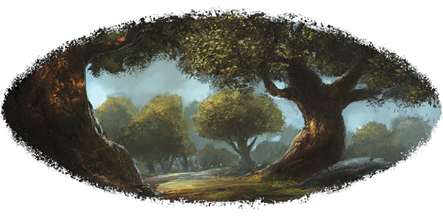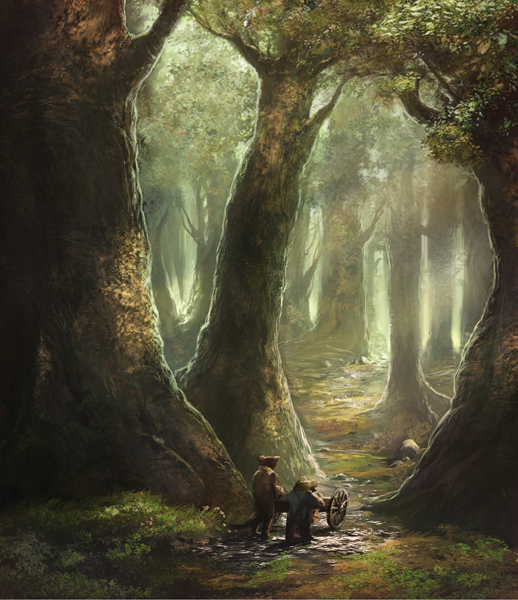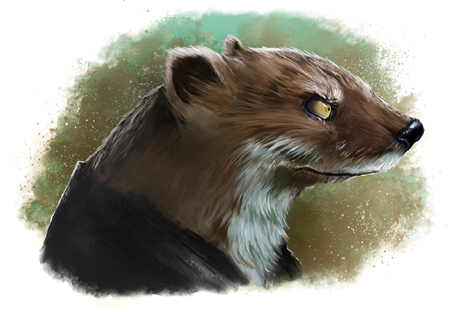
CHAPTER THIRTEEN
The Wild Wood

In which Humphrey and Sammy have an adventure that changes them forever.
Courage comes in many forms. For a smallish, defenseless toad, Humphrey evinced courage at the moment he and Sammy stepped into the Wild Wood. Of course, Humphrey knew better than to go there, but Sammy, who knew all the trails and passages and shortcuts, and whose mother was second cousin to the Chief Weasel, assured him that they would be safe together. So Humphrey stepped into the Wild Wood, pistol-less and cudgel-less, shielded by nothing more than the friendship of a small, bedraggled weasel. Is that not a form of courage? (Or, perhaps, stupidity?46)
Anyone from the Hall who had been up early enough could have traced the path the two left behind in the silvery dew, first to the gardener’s shed, and then straight to the Wild Wood. But no one saw them go. And by the time the cry of alarm went up, the sun’s warmth had long since erased their tracks.
They took turns pushing the gardener’s second-best wheelbarrow and talked of the glory of making the balloon fly again, to say nothing of the rich reward.
Sammy said, “What are you going to do with your half, Humphrey?”
“I’m going to buy a magnifying glass, I think, or a microscope if the funds will stretch that far. How about you, Sammy?”
“I think I’ll buy some winter boots for me brother and me to share, and perhaps a big hank of wool for me mam. Me mam knits up a storm.47 She has to, you see, what with there being so many of us and all.”
Humphrey fell silent and contemplated the yawning gap between full-time ownership of a magnifying glass and half-time ownership of a pair of boots. Then and there, he resolved that Sammy should have the entire reward, for he was a good-hearted toad and couldn’t bear the thought of his friend going barefoot every other day through the long snows of winter. It would be reward enough just to see the balloon soar again.
The sun was above the horizon when they passed a pair of hedgehogs walking to the shops. They gave Humphrey an odd look but said good morning politely enough. Then they passed a rabbit who cast nervous glances about him as he scurried by. This was not as bad a sign as it might have been in some other animal, for the rabbits were nervous at all times, whether there was good cause or not.48 Then they came upon the baker making her daily rounds, a comely rat with neat ears and silky fur, carrying a large basket filled with fragrant loaves and dainty cakes; she trailed about her the enticing scent of freshly baked bread, more alluring than the costliest perfume.
“Good morning, boys,” she said, scrutinizing the odd pair and their wheelbarrow.
“Good morning, miss,” they murmured.
She passed them by and then turned around and called after Humphrey. “Young toad,” she said with an edge of concern, “does your mother know that you are in the Wild Wood?”
“My mother is in Italy, miss,” said Humphrey politely, which was, strictly speaking, true, although it dodged the real question.
“Italy! Good gracious. But who is looking after you?”
Sammy piped up, “It’s all right, miss. He’s with me.”
“That’s all well and good,” she said, “but you will be out by dark, won’t you? I, and others like me, have safe passage by day to sell our wares, but even we do not linger when the sun sets.”
Sammy placed his paw on Humphrey’s shoulder and said, “He’s me friend, miss. I’ll see no harm comes to him.”
“I am greatly relieved to hear it.” She reached into her basket and pulled out two currant scones. “Would you like these? I baked them fresh this morning.”
They thanked her politely and sat down to eat them. She went on her way, casting an uneasy glance or two over her shoulder at them.
They marched on and on, deeper and deeper into the wood, the wheelbarrow growing heavier and more ungainly by the hour. The brush grew thicker, and the beech and elm grew taller, until they came to the darkest heart of the forest where the boughs of the ancient oaks met overhead, blocking out the light. The air was cold and dark and still, and the underbrush was damp where the sunlight did not penetrate; Humphrey shivered and wished he was back at the Hall, or had at least worn warmer clothes. He was weary and chilled and then, to top it all off, managed to bark his shins against a tree root.
After a couple of wrong turns and frustrating about-faces, they finally came to the clearing where Sammy had last seen the balloon. And there it lay, crumpled against a stump. It was a sad sight indeed, a deflated rubbery skin puddled on the ground like a yellow pond. Its many lines were tangled in vicious snarls, and the wicker basket was partly smashed in.

Humphrey’s heart sank, for although Sammy had warned him, he hadn’t imagined it in such a sorry state. It was no longer noble or glorious; in fact, it was no longer recognizable as an airship. He circled the wreckage, muttering, “Oh, dear, oh, dear, what a shame. Another of Uncle Toad’s grand schemes come to grief. Still, we might be able to fix it once we get it home.”
“What about the pound?” Sammy said anxiously. “We’ll still get the pound, won’t we? Even though it’s a smash-up?”
“Yes,” said Humphrey, “we’ll still get the pound. Uncle Toad just wants it back. He didn’t say it had to be flyable.”
“You’re sure?” fretted Sammy, visions of new boots and woolly scarves dancing away just out of reach.
“Oh, yes, most generous is Uncle Toad. He’s never mean with his money.” He held up a section of the canopy and examined a long rip. “Hmm. I think this piece could be sewn together without too much difficulty. Now, that bit over there … that looks like another matter entirely.”
So intent was Humphrey on examining the pathetic remains that he did not notice two sharp wedge-shaped faces in the undergrowth, watching his every move with hard, calculating eyes.
“All right,” Humphrey said. “I think I’ve figured it out. We’ll have to cut some of these lines, roll the canopy up, put it in the wheelbarrow, and then put the basket on top. Good thing I’ve got my pocket knife.”
They bent to their task, and at that very moment, out from the bushes stepped the Chief Weasel and his hard-boiled henchman, the Under-Stoat.
“Hello, young Sammy,” purred the Chief. “Won’t you introduce us to your friend?”
Humphrey froze, his knees turned to jelly. His every instinct shrieked at him to flee, to run from there just as fast as his feet would carry him, but his legs would not obey. He stood rooted to the spot in primordial terror.
“Don’t be afraid,” crooned the Chief in silky insinuating tones. “You’re our guest here. We was just about to have us a bite of lunch, and we was so hoping you could join us. Sammy, do the honors and introduce us.”
Sammy squirmed uneasily. “Uh, Chief, this is my friend, Humphrey.”
“Ah, young Marster Humphrey. Pleased to make your acquaintance, I’m sure.” The Chief bowed.
The Under-Stoat sniggered nastily and said, “Yeah, ri’. Pleased.”
The Chief Weasel elbowed him and snapped, “Get our lunch, you, and look sharpish about it. I’m sure these young gentlemen are plenty fatigued from their long walk. And mind you don’t forget the tablecloth.” The Under-Stoat slunk into the brush and returned a moment later with a checkered cloth and a basket that he proceeded to unpack.

Humphrey found his voice and squeaked, “That’s—that’s most kind of you, sir, but I’m expected back at Toad Hall.”
“Is that right?” said the Chief Weasel in a casual sort of way. “Last I heard, your uncle was off at Cambridge. Here, come and sit down. There’s all sorts of good things to eat.”
Humphrey glanced tensely at Sammy, whose eyes were fastened on the meat pies and sausage rolls being spread before them, and said, “Don’t you think it’s time to go?”
Sammy said eagerly, “Let’s stay for a bite, Humphrey. That currant scone was an awful long time ago.” He plunked himself down.
Humphrey hesitated. His stomach agreed that the currant scone had indeed been an awfully long time ago. And although the stoat and weasel standing before him were the very ones he’d been warned about, they smiled warmly and exhibited concern that he feel at home. Sammy’s mother was second cousin to the Chief Weasel, was she not? And wouldn’t it be sheer rudeness to leave at that point? The food lay before him. His stomach cast the decisive vote by grumbling loudly. He sat down.
“Tuck in, you two.”49 The Chief smiled. He proved to be surprisingly good company, making engaging small talk and inquiring kindly about the Mole and the Rat and Mr. Badger and Professor Toad, and were they in good health, and how were they spending their time, and who was going on holiday, and exactly where and when. He also expressed great interest in the principles of lighter-than-air flight, asking many questions about how the balloon might possibly be fixed, and if Humphrey thought it could ever fly again.
Finally, when all had eaten their fill, Humphrey brushed the last crumbs from his lap and said, “Mr. Chief Weasel, thank you so much for lunch. But it’s time for us to be heading back. If you don’t mind, we’ll just load up the balloon and be on our way.”
“Ah. Well.” The Chief Weasel stroked his whiskers. “It’s about the balloon. There is something you can do for us.” His expression changed, and he pinioned Humphrey with an evil smile that made the toad’s blood run cold. “’Course, you’ll have to stay with us awhile.”